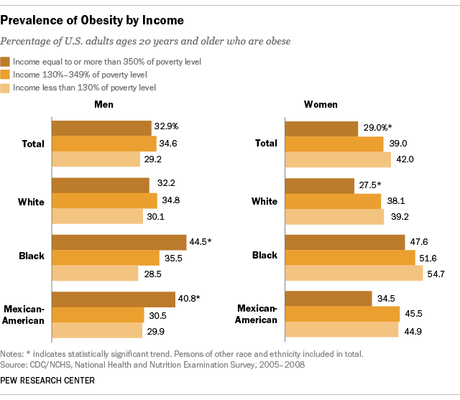
The Wealth Effect works like this: an increase in someone's net worth has a strong correlation to an increase in their spending habits even if their incomes remain unchanged.
The Health-Wealth Effect works like this: an increase in someone's obesity level has a strong correlation to a decrease in his or her potential career earnings, higher healthcare costs and lower net worth.

After studying the CEO's of Fortune 1000 companies, Michigan State University professor Mark Roehling concluded the different results for women than for men suggest weight bias may contribute to the glass ceiling on the advancement of women to the top levels of management. "The results suggest that while being obese limits career opportunities of both women and men, being 'merely overweight' harms only female executives. This pattern of findings is consistent with previous research indicating that, at least among white Americans, there is a tendency to hold women to harsher weight standards."
Obese women are also half as likely to attend college, 20% less likely to get married and seven times more likely to experience illness, depression or death from being overweight.
Chicken or the EggDoes someone weight more because they are poorer or are they poorer because they weight more?
Dan Engber in a Slate Magazine article wrote, "Unpacking this causality amounts to untying a Gordian Knot. Sickness, poverty and obesity are spun together in a dense web of reciprocal causality. Anyone who's fat is more likely to be poor and sick. Anyone who's poor is more likely to be fat and sick. And anyone who's sick is more likely to be poor and fat."
In short, poverty might make some people obese, but obesity definitely makes many people poorer.
IncomeExecutives with larger waistlines and higher body-mass index readings tend to be perceived as less effective in the workplace, both in performance and interpersonal relationships according to data compiled by the Center for Creative Leadership. Barry Posner, a leadership professor at Santa Clara University, says he can't name a single overweight Fortune 500 CEO. "We have stereotypes about fat so when we see a senior executive who's overweight, our initial reaction isn't positive."
Health CareAccording to the National Bureau of Economic Research, medical costs for weight related diseases is estimated to be $190 billion annually-or 20 percent of national health-care spending,
Stamina"Because the demands of leadership can be quite strenuous, the physical aspects are just as important as everything else," says Sharon McDowell-Larson, an exercise physiologist who runs an executive fitness program for the nonprofit Center for Creative Leadership. "People who are obese may not have the energy or stamina that is necessary to successfully run a business all day everyday."
Mental BandwidthResearch by the American Journal of Public Health found the very condition of poverty tends to focus the mind on immediate goals, which makes non-essential tasks, such as dieting and exercising, all but impossible.
No Simple SolutionsJohn Cawley, a reporter with the National Bureau of Economic Research introduced a workplace wellness program where colleagues deposited money and stood to receive payments for their weight loss. More than two-thirds of the participants dropped out within a year and the results showed practically no positive effect. The third of the participants that did stay in for the full year had lost, on average, just two pounds more than the control group. He added "There are also prescription and over-the-counter solutions but there is very little, if any evidence suggesting that [weight loss] products are effective and some have potentially fatal side effects."
